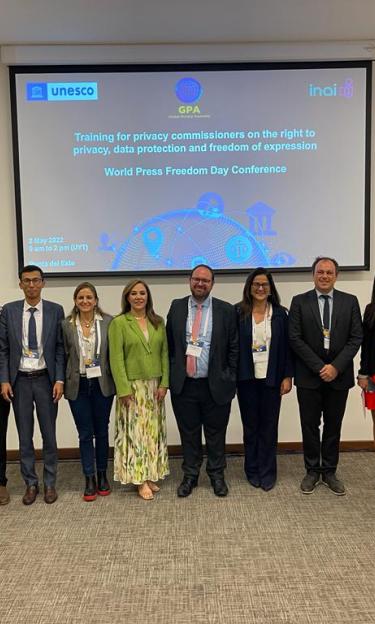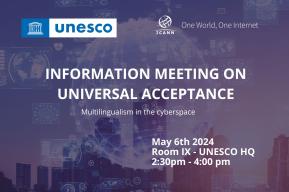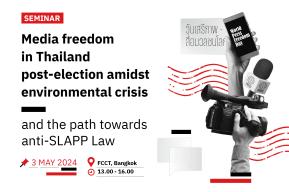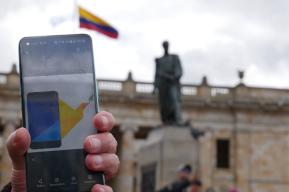Article
UNESCO organizes first training for privacy commissioners on privacy right, data protection and freedom of expression

This very first training on the interconnections between the right to privacy, data protection and freedom of expression brought together 9 privacy commissioners from Africa, Arab region, Asia and Latin America, and the United Nations Special Rapporteur on the Right to Privacy, Ms Ana Brian Nougrères.
During the workshop, relevant case studies and important landmark decisions from regional human rights courts were examined by speakers, engaging the participants in a reflection on how the right to privacy, the right to information and the right to freedom of expression are all deeply correlated. In today’s digitalized world, new technologies are progressively defining the ways citizens relate to information, and often put forward situations where the balance between the right to privacy and freedom of expression requires careful consideration. The gathering of data, on the other hand, affects individual rights, as data are being continuously collected for, among others, economic analytical reasons. Data protection is thus relevant in order to preserve a considerable array of rights and values, from self-determination to non-discrimination, including freedom of expression.
The need to consider these rights as complimentary rights, rather than opposing ones has been stressed by the President of the General Privacy Assembly (GPA) and Commissioner of the National Institute for Transparency, Access to Information and Personal Data Protection of Mexico (INAI), Blanca Lilia Ibarra Cadena:
As representatives of public institutions that exercise authority functions in relation to the protection of personal data, we must remain very alert about the advances and new challenges that have arisen in the matter, as well as their short and long-term effects on the exercise of other fundamental rights and freedoms. […] Therefore, it is necessary to take a comprehensive approach to examine the links that exist between the right of access to information, the exercise of freedom of expression and the protection of the right to privacy.
During his opening remarks, the Chief of Freedom of Expression and Safety of Journalists Section, Guilherme Canela called the attention on the importance of raising the knowledge and capacities of judicial actors and privacy commissioners on these essential human rights:
This workshop [therefore] serves as an opportunity to, for the first time, involve privacy commissioners, as important guarantors of these rights, in the discussion. It will serve as a trigger for open dialogues among privacy commissioners from different regions around the world, thereby fostering the exchange of good practices and the creation of a network of experts to strengthen the respect for these fundamental rights globally.
The training was also an opportunity for Dr Lida Ayoubi, Senior Lecturer at the School of Law Auckland University of Technology, New Zealand, to present via a recorded video the latest trends and challenges in the right to access information and privacy.
The Commissioner of the Information Regulator in South Africa, Ms. Hellen Shube expressed that “the seminar was very informative and eye-opening. The principles shared on balancing the right to privacy and freedom of speech were insightful”.
The workshop also represented the opportunity to officially launch UNESCO’s Guidelines for Judicial Actors on Privacy and Data Protection, which will be available in all UN languages and Portuguese. The Guidelines, developed by Danilo Doneda, Lawyer and Law Professor at IDP and coordinator of the Centre for Internet, Law, and Society of IDP - who was also the trainer of the workshop - aim to provide a general framework for judicial actors to assess matters of privacy and data protection in the face of other rights, such as freedom of expression and the right to privacy, and the challenges in upholding these rights in the face of new technologies.
In extent to this training, UNESCO has also cooperated with the Columbia University’s Global Freedom of Expression initiative to expand its online collection of case law on cases related to privacy, freedom of expression and the safety of journalists globally. Notably, 22 cases on privacy from different courts around the world were added to the already extensive case law database. Through these cases, a light is shed on the different tensions and mutual reinforcements that exist between freedom of expression and privacy.
The publication of UNESCO’ Guidelines for Judicial Actors on Privacy and Data Protection, and the organization of the training workshop for the privacy commissioners have been supported by UNESCO’s Multi-Donor Programme on Freedom of Expression and Safety of Journalists, and by the Open Society Foundations.
The training workshop for privacy commissioners was part of UNESCO’s Judges Initiative which aims to reinforce the capacities of judicial actors to promote freedom of expression and safety of journalists, by ensuring prosecution and trial of those responsible for attacks against journalists, as well as more broadly prevent indiscriminate actions against free speech. As part of this initiative, since 2013, UNESCO Judges’ Initiative has raised the capacities of judicial actors on international and regional standards on freedom of expression, access to information and the safety of journalists in over 150 countries around the world. Over 23,000 judicial actors, including judges, prosecutors, and lawyers, have been trained on these issues, notably through a series of Massive Open Online Courses (MOOCs), on-the-ground training and workshops, and the publications of a number of toolkits and guidelines.








